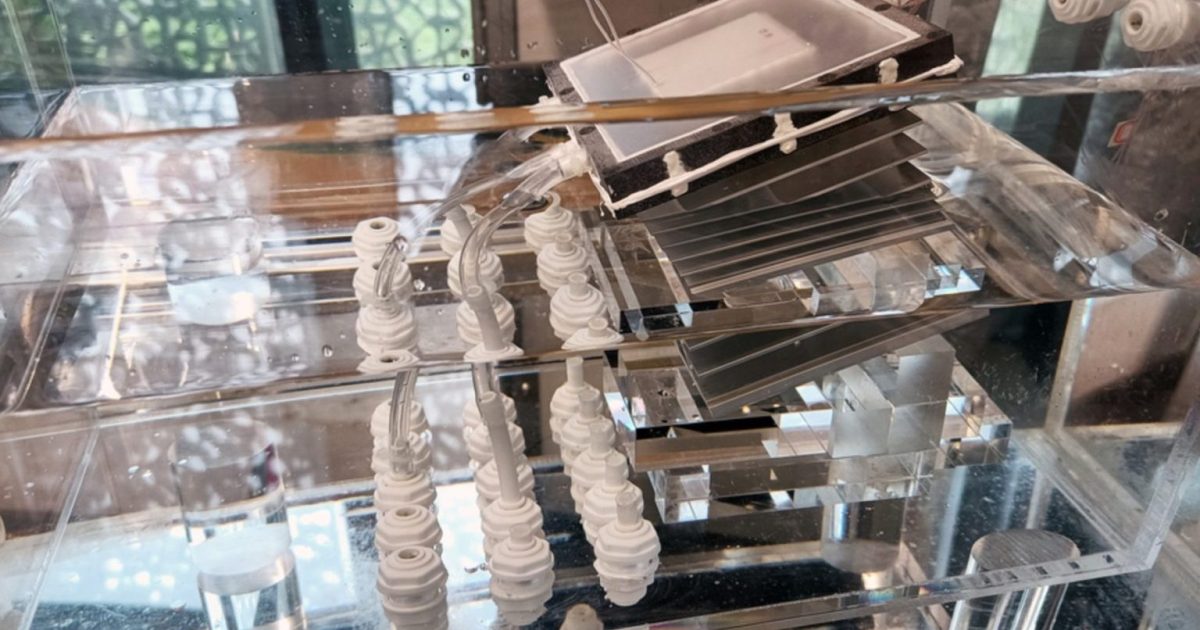MIT engineers and collaborators developed a solar-powered device that avoids salt-clogging issues of other designs.
deleted by creator
Desalination can be as easy as evaporation. But the volume over time is abysmal.
The faster you clean it the faster you build up the salt.
Like everything, problems appear at scale that aren’t even a concern at the individual level.
Bet Nestle shuts this shit down somehow…
Edit: damn I can’t spell for shit
Big box with pipe pointing up in the middle that exits the box through the bottom to reach a collection tank
Fill with salt water without going past the pipe opening
Add transparent lid with a slope towards the middle so the water condenses and drops in the pipe
Go do whatever you want all day, you’ve got a passive drinking water creator and nothing to clog since solids just accumulate at the bottom and can be scooped out as needed.
Scooped out and put where?
Most of it is salt, I know many places where they would gladly buy it for winter road maintenance.
Small question (perhaps dumb on my part as I haven’t slept yet), do these desalination system remove other chemicals such as PFAS, arsenic, lead? I think I read that they use nanofiltration membranes to remove almost everything. How about molecules that are smaller than water (H₂O)? Do they get filtered?
Depends if they also evaporate.
Most molecules aren’t smaller than water, however filters that are small enough to only let water through clog pretty quickly. That said, most heavy metals and salts won’t evaporate in a decent still (which is good, because atoms and ions are often smaller than water). I’m not sure about PFAS and microplastics, but I expect they don’t evaporate.
Yeah, no. It won’t be cheaper than tap water. The amount of energy required for desalination, clogging or no, is an additional cost on top of what you need to do to get water drinkable with non salinated water. So no matter the energy source, this cost has to be factored in and that will automatically make it more expensive. No free lunches in physics.
You are ignoring that saltwater is available in many, many more places than freshwater. Building a local efficient desalination plant can absolutely be more cost-efficient than transporting freshwater for hundreds of kilometres. Don’t simplify so much you lose all perspective.
I am not ignoring that, it is also vastly more contaminated than fresh water with microplastics and all the other grabage shipping companies and countries have been dumping into it for the better part of a century now.
I’m not saying it is impossible to do or not a potentially sensible option in certain places, I am saying it is not going to be cheaper than tap water anywhere.
This system uses a variant of distillation to desalination the water. This means that a good part of the filtration and purification process required to make most fresh water potable would no longer be necessary, so it could be cheaper than regular tap water, especially in places where the starting water just isn’t that great to begin with. It also is solar powered and looks like it could be pretty scalable, so it may be a viable option.
I’m not saying it is impossible to do or not a potentially sensible option in certain places, I am saying it is not going to be cheaper than tap water anywhere.
How does this work? If it’s a sensible option in certain places (those without access to tap water), how can tap water be cheaper? Why wouldn’t everybody just bring tap water to those places as well if it was cheaper?
It might still be more expensive but more resilient to other external factors such as embargoes, wars, whatever might influence delivery of other water sources. Cost isn’t the only factor to decide what technology or solution should be implemented.
It is usually the driving factor in our global economy.
I don’t see how your point makes sense - transport can easily make tap water more expensive than salt water, but you’re acting like it’s literally impossible for transportation costs to be higher than desalination costs. Why?
It won’t be cheaper than tap water.
Wait a few years.
deleted by creator
My presumption is that the desalinated water might be cheaper than tap, but would still require further processing to be considered potable, which would raise the price on par or above conventionally sourced tap water. I imagine there’s a lot of costal areas though with ready access to saltwater and minimal access to freshwater where it’s worthwhile.
Cheaper than tap but at a 500% markup for CoNvEnIeNcE! You know that if it’s cheap, the large black scarf buckets (c*pitalists) will come in and force the prices to go up until nobody can afford it.
Truly the most reposted link in lemmy history
Something like this, I’d bet! https://www.youtube.com/watch?v=Ejvvou7d-kg
That guy was annoying as hell.
With the 2fps photo transitions and verbally saying “thirsty af” I had to quit
It is the same thing.
Yet somehow makes me less interested than the article.
It’s a solar still with running water. That’s it.
How tf did it take MIT engineers to figure that out?
It is explained in the link.
A hint, just after the title: “MIT engineers and collaborators developed a solar-powered device that avoids salt-clogging issues of other designs.”
Yeah, they developed a solar still with running water. That’s it. It’s a solar still that uses moving water to get rid of the salt.









